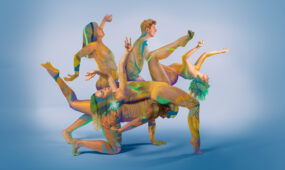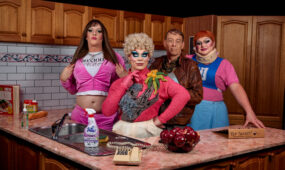Quartet: a bittersweet tale of ageing
Theatre

Writer Ronald Harwood may best be known for his highly successful play The Dresser, the film The Pianist and his excellent book and video series All the World’s a Stage, a thoroughly comprehensive analysis of the major eras in theatrical history.
His play Quartet is the story of four ageing opera singers who, having fallen on hard times, find themselves living in a retirement home and coming to terms with their gradual physical and mental deterioration.
Harwood has written a terrific opening speech which actor Brian Knott, as the somewhat sex-obsessed Wilfred Bond, delivers with a delicious sense of cheeky ribaldry in this Adelaide Repertory Theatre production. Knott maintains the energy throughout of a man desperately hanging onto the joys of life.
The characters live by the saying that there is no room for self-pity in their lives, so Quartet takes a positive stance on ageing and suggests individuals should make the most of each day and value what they have instead of whinging about what may be going wrong with them; instead of mourning the past, people should reflect on, and cherish, the positive things they have experienced in their lives.
Russell Starke plays Reginald Paget, a dignified, gentlemanly character who is not amused by Bond’s innuendos and double entendres. Julie Quick, as Cecily Robson, happily listens to opera through her headphones and instantly gets laughs as she unwittingly becomes the butt of Bond’s suggestive remarks.
The trio work quite well as they establish the former glory they all enjoyed as successful opera singers, and their varying degrees of acceptance of their gradual physical and mental decline.
Quick creates the energy of a woman who feels young in mind while being trapped in an older body: she finds the comedy in memory loss while also savouring the more poignant moments of dementia. Harwood has her lusting after the young, muscly gardener and so it is not just the men painted as having sexual inclinations as they age.
Into the relative harmony enters Jean Walker as Jean Horton, a much more difficult and demanding diva, whose presence revives some less pleasant memories for them all. The trio are looking forward to singing in a gala concert performance in honour of Giuseppe Verdi’s birthday but Houghton obstinately refuses to perform.
Unfortunately the actors are working in front of an atrociously painted wall that ruins the aesthetics of the space and dominates and restricts their performance. After interval, the wall eventually flies out and the actors are located in a much more interesting and attractive setting.
Director Sue Wylie has developed characterisations that avoid stereotyping senior citizens and artistes, while still revealing temperaments that we can recognise and identify with.

Get InReview in your inbox – free each Saturday. Local arts and culture – covered.
Thanks for signing up to the InReview newsletter.
Although the characters reveal aspects of themselves in act two, Harwood’s play doesn’t allow for major revelations, comic climaxes or dramatic conflicts, though there are some good lines and comic potential. There are also sensitive moments that reflect the closeness of the singers and how they have come to value and appreciate their circumstances, such as when Reginald shows concern for Cissy as she seems to be losing her mind and he fears that she may be taken away.
Quartet winds its way to the four singers performing Rigoletto: they are dressed in finery and they mime and perform in an operatic style. The finale reflects the nature of the evening in that it is mildly amusing but seems to repeat gags and it goes on a bit too long.
Adelaide Repertory Theatre is presenting Quartet at the Arts Theatre, Angas Street, until April 18.
Support local arts journalism
Your support will help us continue the important work of InReview in publishing free professional journalism that celebrates, interrogates and amplifies arts and culture in South Australia.
Donate Here






Comments
Show comments Hide comments